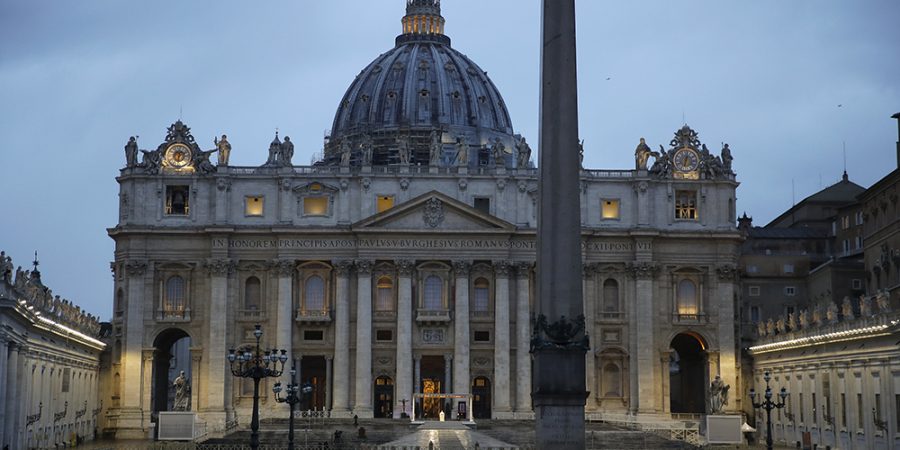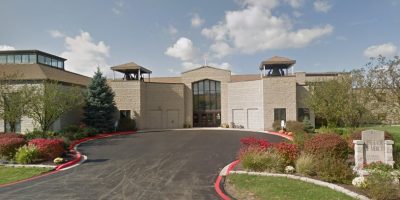The Urbi et Orbi, meaning to the city and the world, is a blessing usually delivered by the Roman pontiff at Christmas and Easter.
Pope Francis says ‘We are all in the same boat,’ during Urbi et Orbi ceremony

“We have realized that we are on the same boat, all of us fragile and disoriented, but at the same time important and needed, all of us called to row together, each of us in need of comforting the other,” he said during his homily in front of a rainy St. Peter’s Basilica, before an empty square and a single priests.
Amid this pandemic, Francis said, we “have realized that we cannot go on thinking of ourselves, but only together can we do this.”
The pope delivered his homily after the eucharistic adoration during his extraordinary Urbi et Orbi ceremony, which he announced on Sunday (March 22).
The Urbi et Orbi, meaning to the city and the world, is a blessing usually delivered by the Roman pontiff at Christmas and Easter.
It offers plenary indulgence, which means the forgiveness of sins to the faithful present and watching through media outlets.
Francis drew from the day’s Gospel lesson, found in the fourth chapter of Mark, which relates the story of Jesus and his apostles being caught in a storm while on a boat. The pope said the story can offer spiritual guidance about how to face the coronavirus pandemic.
Just as it happened with the disciples, the pope said, we too are faced with a “darkness.”
“Thick darkness has gathered over our squares, our streets and our cities; it has taken over our lives, filling everything with a deafening silence and a distressing void, that stops everything as it passes by; we feel it in the air, we notice in people’s gestures, their glances give them away,” Francis said.
“We find ourselves afraid and lost,” he added.
The words are especially true in Italy, among the countries that has suffered the most casualties due to the pandemic. The entire peninsula has been under quarantine since March 9, with people not being able to leave their homes except to go to the supermarket and pharmacy stores. In the Catholic-majority country, all Masses, weddings and funerals have been banned.
In the passage described in the Gospel, the apostles are fear-stricken and ask for the intervention of Jesus, who is asleep on the boat.
When he is awakened, after calming the storm, he asks his disciples, “Why are you afraid? Have you no faith?”
“The storm exposes our vulnerability and uncovers those false and superfluous certainties around which we have constructed our daily schedules, our projects, our habits and priorities,” Francis said.
The pandemic, he said, “shows us how we have allowed the very things that nourish, sustain and strengthen our lives and our communities” to become “dull and feeble.”
“The tempest lays bare all our prepackaged ideas and forgetfulness of what nourishes our people’s souls; all those attempts that anesthetize us with ways of thinking and acting that supposedly ‘save’ us, but (they) instead prove incapable of putting us in touch with our roots and keeping alive the memory of those who have gone before us,” he said.
“We deprive ourselves of the antibodies we need to confront adversity.”
The pope condemned the way humanity has treated the environment, taking it for granted and seeking greed rather than justice. “We carried on regardless, thinking we would stay healthy in a world that was sick,” he said.
This present time, Francis added, is “a time of choosing.”
As we are asked to stay at home and put social life on hold, people have a chance to “choose what matters and what passes away, a time to separate what is necessary from what is not,” he said.
The Pope pointed to the numerous examples of faith that guide humanity through their witness and work, including the efforts of priests, social workers, volunteers, nurses, supermarket employees and doctors.
They teach us, the pope said, to offer ourselves to others amidst this pandemic.
“Let us invite Jesus into the boats of our lives. Let us hand over our fears to him so that he can conquer them,” he said. “Like the disciples, we will experience that with him on board there will be no shipwreck.”
An icon of the Virgin Mary holding the infant Jesus, known as Salus Populi Romani, and the crucifix of San Marcello were displayed in front of St. Peter’s Basilica during the ceremony.
Pope Francis visited the two religious artifacts, historically used to pray for the end of plagues, when he walked through the streets of Rome on March 15.
Read more news at XPian News… https://xpian.news



Comments are Closed